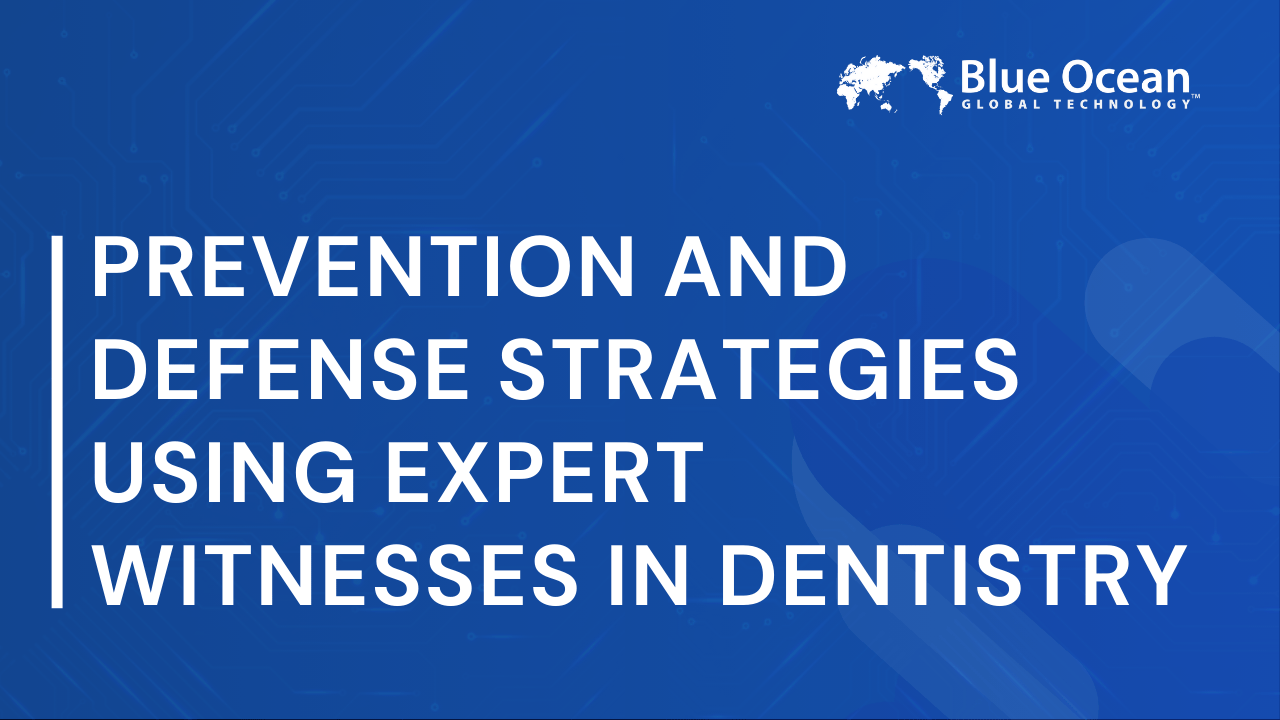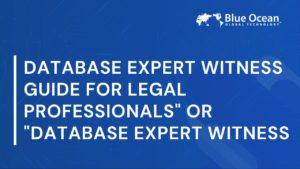Introduction
Even small mistakes or omissions can have major repercussions for a dentist. A malpractice claim might stem from a misdiagnosis, incomplete records, lack of patient consent, or even a misunderstanding. In reality, no matter how careful or skilled you are, patients may still feel misled, hurt, or uninformed. And that idea alone might put your reputation at risk.
Malpractice cases are often long, stressful, and damaging. That’s why legal awareness is as essential as clinical skill. Expert witnesses play a key role by showing whether your care met accepted standards and explaining unavoidable outcomes. An expert witness in dentistry helps clarify whether your actions aligned with the accepted standard of care and can explain outcomes that weren’t avoidable.
This article will show you how to reduce the risk of litigation through prevention, and how to defend yourself with expert witnesses if a case arises.

Understanding Expert Witnesses in Dentistry
A dentist expert witness is a licensed and experienced professional who offers specialized expertise to help the court assess claims of malpractice or negligence. An expert must show proficiency in the area relevant to the case, such as oral surgery, prosthodontics, pediatric dentistry, or general practice.
What matters most is credibility. Courts value witnesses who are not only technically competent but also credible, impartial, and capable of explaining complex ideas in simple terms.
Common Areas a Dental Expert Witness Covers
Expert witnesses are commonly involved in cases involving:
- Dental malpractice: They investigate if a dentist erred or provided substandard care.They will also check to see if the patient was harmed by that error.
- Oral and maxillofacial surgery: An expert witness in dentistry verifies the safety and correctness of surgical operations such as jaw surgery or wisdom tooth extraction.
- Dental diagnoses: They check to see if diseases like oral cancer or infections were appropriately diagnosed and communicated to the patient.
- Dental implants and prosthetics: They evaluate the correct placement and upkeep of bridges or implants and discuss the possible causes of the issues.
- Dental materials and devices: They verify that the materials used, such as crowns, fillings, and other procedures, adhere to industry safety and quality requirements.
- Forensic dentistry: They can use bite marks as evidence or dental data to assist in identifying individuals in criminal cases.
- Traumatic injuries: They describe the necessary treatment for injuries resulting from attacks or accidents that impact the jaws, teeth, or facial tissues.
- Orthodontics: To make sure the care was suitable, they check braces, aligners, or other treatments.
- Oral pathology: When oral infections and illnesses are involved in a case, they provide their opinions.
- Tooth fractures and restorations: They clarify if restorative therapy was successful or how and why a tooth cracked.
- Informed consent: Before consenting to therapy, they verify that patients were fully informed about the risks, advantages, and available options.
- Treatment disputes: They examine disagreements over treatment plans, invoicing, or the need of a certain operation.
Expert witnesses in dentistry must be honest and impartial. Their duty is not only to the dentist who hired them but also to the court. If they appear biased, their testimony loses weight.

Prevention Strategies
Preventing malpractice before it occurs is the most effective strategy for managing risk. Dentists who manage risks, speak honestly, and practice meticulously are less likely to ever face lawsuits.
Clinical Practice
Dentists can lower risks in different ways. Most importantly, provide accurate diagnoses and create appropriate treatment plans. To ensure that patients receive safe and efficient care, they should adhere to professional standards and evidence-based practices. To safeguard patients and employees, they must also uphold stringent infection control and safety protocols.
Documentation & Recordkeeping
Good recordkeeping is one of the strongest protections a dentist can have. This entails recording patient consent, noting all treatment choices presented, and maintaining thorough and current dental records.
Records are easier to view, secure, and exchange when necessary with digital systems. In addition to serving as evidence in the event that concerns regarding care are raised, clear documentation can help avoid confusion in the future.
Patient Communication
A lot of issues may be avoided with open and sincere communication. Dentists ought to establish reasonable expectations on the capabilities and limitations of a therapy. After significant operations or consultations, they must give patients written summaries and clearly explain the risks, advantages, and expenses. Patients are less prone to misunderstand or complain when they feel informed and involved.
Continuing Education & Training
It’s critical to stay updated. Dentists can participate in peer reviews, learn from case discussions, and stay up to date with new standards of care. Additionally, it’s important to recognize when a situation calls for a professional and to refer when needed. Dentists can maintain their competence and confidence in their work by continuing their education.
Risk Management Protocols
When anything goes wrong, having safety procedures in place can make all the difference. To make sure they adhere to legal and clinical requirements, practices should set up a clear procedure for reporting and evaluating occurrences or near misses and conduct routine audits. Having sufficient malpractice insurance is also essential as it guards against the monetary risks associated with a lawsuit.
Defend with Confidence
Connect with dental experts early to prevent disputes and strengthen your defense if challenges arise.
Defense Strategies Using Expert Witnesses
Even with the best prevention, some dentists will face legal claims. In these cases, expert witnesses are critical to the defense.
Case Review and Evaluation
Records, treatment notes, and results are closely examined by experts. They can verify if the dentist adhered to the recognised level of care or point out any potential problems.
Strengthening Legal Defense
In order to assist a jury comprehend what transpired, expert witnesses in dentistry simplify complicated dental procedures. They also clarify that negative outcomes do not always mean misconduct. Even with the right treatment, difficulties might occasionally arise. Most significantly, they can demonstrate instances in which a dentist took the right actions, bolstering the defence.
Cross-Examination Preparedness
The lawyer and dentist can prepare for difficult questions from the other side with the assistance of an expert. They examine the plaintiff’s expert’s reports and highlight any flaws in their reasoning. This planning lessens the likelihood of surprises in court.
Collaborating with Legal Counsel
Dentists, attorneys, and expert witnesses must communicate openly. When everyone works together, the defense is clearer and more persuasive to the court.

Best Practices for Dentists
-
- 1. Build Good Habits Everyday
Maintain thorough records, clearly communicate treatment alternatives, and adhere to infection control and safety regulations. These regular routines help prevent misunderstandings and demonstrate professionalism in the case that your work is questioned.
-
- 2. Connect with Experts Early
Don’t put off getting help until an issue has occurred. Establishing connections with reliable dental expert witnesses in advance guarantees that you have dependable experts on hand to fill in if necessary.
-
- 3. Be Transparent with Patients
Patients are less likely to file a lawsuit if they feel valued and educated. Give patients a thorough explanation of the expenses, dangers, and advantages in simple terms, and let them know they are welcome to ask questions.
Conclusion
The majority of dental malpractice lawsuits begin with straightforward problems. The good news is that with careful practice and solid patient relationships, these issues may frequently be avoided.
Dental expert witnesses can be useful when situations do arise. They provide the court with an explanation of dental care, verify that the treatment complied with professional standards, and explain situations in which the results were just inevitable.
The greatest defence for dentists is to avoid litigation by practicing strong clinical and communication practices and, when necessary, to depend on expert witnesses to defend treatment. This method guarantees justice in the courtroom, safeguards patients, and maintains professional reputations.
Frequently Asked Questions
What Does a Dental Expert Witness Actually Do?
A dental witness expert provides courts with an understandable explanation of dental procedures, standards of care, and potential mistakes. They provide expert views, examine documents, and even testify in court.
When Should a Dentist Consider Consulting an Expert Witness?
As soon as a legal question or malpractice claim arises, it is essential to speak with an expert. In order to be ready for any instance that may come up, some dentists even establish contacts with specialists in advance.
Can Dentist Expert Witnesses Help Prevent Lawsuits?
Yes. Experts advise dentists on recordkeeping, safety regulations, and best practices, but their primary function is in legal disputes. In the first place, litigation risk can be decreased by heeding this advice.
Build Legal Confidence
Discover prevention strategies and expert support that protect your reputation and career in dentistry.












